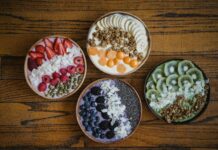You’ve probably noticed more people ordering veggie burgers, sipping almond milk lattes, or proudly sharing their tofu stir-fry on social media. Plant-based diets have gone from fringe to fashionable—and for good reason. Whether it’s for your health, the planet, or both, this way of eating is gaining serious traction. But is it all hype or truly a life-changing shift? Let’s dig into the delicious, colorful, and powerful world of plant-based living.
🥗 What Is a Plant-Based Diet?
Definition and Core Principles
At its heart, a plant-based diet focuses on foods derived from plants—fruits, vegetables, grains, legumes, nuts, and seeds. It minimizes or entirely excludes animal products. But it doesn’t always mean 100% vegan; it’s more about making plants the star of your plate.
Common Types
- Vegan – No animal products at all.
- Vegetarian – Includes dairy and/or eggs, but no meat.
- Flexitarian – Mostly plants, but occasionally meat or fish.
- Whole-Food Plant-Based (WFPB) – Focuses on minimally processed plant foods, avoids oils and refined sugars.
Plant-Based vs. Vegan
Not all plant-based eaters are vegan. Veganism is a lifestyle and ethical stance, while plant-based eating is primarily about nutrition and health.
❤️ Health Benefits of a Plant-Based Diet
Weight Management and Fat Loss
Plants are naturally lower in calories and higher in fiber, keeping you full longer. Many people find it easier to lose weight without counting calories.
Heart Health and Reduced Cholesterol
Whole grains, nuts, seeds, and leafy greens are known to improve heart health by lowering LDL cholesterol and blood pressure.
Lower Risk of Chronic Diseases
Studies show plant-based diets may help prevent or manage:
- Type 2 diabetes
- Certain cancers
- Hypertension
Better Digestion and Gut Health
Fiber is king here. A variety of fruits and veggies feed the good bacteria in your gut, improving digestion and immunity.
Boosted Energy and Mental Clarity
Many report feeling “lighter” and more energized on a plant-based diet, thanks to reduced inflammation and better nutrient intake.
🍎 Nutrients Found in Plant-Based Foods
Fiber, Antioxidants, Vitamins
Plants are rich in:
- Vitamin C, E, and K
- Potassium and folate
- Antioxidants that fight free radicals
Plant-Based Protein Sources
- Lentils, beans, tofu, tempeh
- Chickpeas, quinoa, nuts, seeds
Essential Fats and Omega-3s
- Flaxseeds, chia seeds, walnuts
- Algal oil as a vegan omega-3 source
🧪 Addressing Nutritional Concerns
Can You Get Enough Protein?
Absolutely. A balanced plant-based plate includes plenty of protein-rich options. Think lentils over steak—it’s possible!
What About Iron, B12, and Calcium?
These nutrients require attention:
- Iron: Spinach, lentils, fortified cereals
- B12: Consider a supplement
- Calcium: Almonds, tofu, fortified plant milks
Tips to Stay Nutritionally Balanced
- Eat the rainbow
- Consider a multivitamin
- Track nutrient intake early on
🌍 Environmental Benefits of Plant-Based Diets
Reduced Greenhouse Gas Emissions
Animal agriculture is a major contributor to methane and CO2 emissions. Eating more plants significantly lowers your carbon footprint.
Conserving Water and Land Resources
Growing plants uses far less water and land compared to raising livestock. A single pound of beef requires over 1,800 gallons of water!
Less Deforestation and Biodiversity Loss
Fewer forests are cleared for cattle grazing or animal feed crops when we eat lower on the food chain.
💰 Economic and Social Impact
Lower Healthcare Costs
Fewer chronic diseases mean reduced spending on medications and doctor visits.
Supporting Local and Sustainable Farming
Plant-based diets often align with seasonal, local produce—better for communities and economies.
Reducing Global Food Insecurity
Plants are more efficient at growing and feeding more people per acre than animal-based foods.
🚀 Transitioning to a Plant-Based Lifestyle
Start Slow with Meatless Days
Try “Meatless Monday” or one plant-based meal per day to ease in.
Simple Swaps and Easy Recipes
- Swap dairy milk for oat milk
- Try a chickpea salad instead of tuna
- Use mushrooms as a burger patty
Grocery Shopping Tips
- Stick to the outer aisles (fresh produce!)
- Check ingredient labels
- Buy in bulk to save money
😬 Challenges and How to Overcome Them
Cravings and Social Pressure
You’re not alone. Cravings fade. And guess what? Plant-based versions of almost everything exist.
Eating Out and Traveling
More restaurants now offer vegan options. Apps like HappyCow help you find them anywhere.
Staying Motivated Long-Term
Keep it fun. Try new cuisines. Join plant-based communities online or locally.
🧐 Common Myths About Plant-Based Diets
“Plant-Based Means Boring”
Heard this? Show them your colorful smoothie bowl or spicy lentil curry!
“You’ll Lose Strength and Muscle”
Top athletes like Venus Williams and Novak Djokovic prove otherwise.
“It’s Too Expensive”
Beans and rice? Among the cheapest foods on the planet. You can eat plant-based on a budget, no problem.
💪 Success Stories and Real-Life Inspiration
Athletes Who Thrive on Plants
- Lewis Hamilton (F1)
- Kyrie Irving (NBA)
- Tia Blanco (Pro Surfer)
Everyday People’s Transformations
From reversing diabetes to shedding 50+ pounds, plant-based diets are changing lives.
👶 Plant-Based Diet for All Ages
Kids and Teens
Support growth with a variety of fruits, veggies, legumes, and grains. Fortified plant milks help too.
Seniors
Helps with mobility, cholesterol, and digestion. Easy-to-chew options like soups and smoothies work great.
Pregnant and Breastfeeding Women
Consult a dietitian, take supplements (like B12 and iron), and focus on nutrient-rich meals.
🍴 Recipes and Meal Ideas
Breakfast
- Overnight oats
- Tofu scramble
- Smoothie bowls
Lunch
- Quinoa salad
- Black bean tacos
- Buddha bowls
Dinner
- Chickpea curry
- Stuffed bell peppers
- Stir-fried tofu and veggies
Snacks & Desserts
- Roasted chickpeas
- Fruit parfaits
- Vegan brownies
🌟 Final Thoughts on Health and Sustainability
Switching to a plant-based diet isn’t just about ditching meat—it’s about embracing a healthier, more sustainable way to live. Whether you go all-in or just start small, every plant-powered bite makes a difference. You don’t need to be perfect—just curious, open-minded, and a little adventurous. Your body, the planet, and future generations will thank you.
❓FAQs
Can I eat out on a plant-based diet?
Yes! Many restaurants now offer vegan or vegetarian options. Just ask or check the menu online first.
Is plant-based food more expensive?
Not necessarily. Staples like beans, rice, and veggies are budget-friendly. It’s processed vegan products that can be pricier.
How do I handle social gatherings?
Bring a dish, inform the host, or eat beforehand. You’ll be surprised how many people are curious and supportive.
Can I build muscle on a plant-based diet?
Absolutely! With the right protein sources and training, many athletes thrive on plants.
What’s the first step to start?
Try swapping one meal a day for a plant-based option. Simple, easy, and effective!























